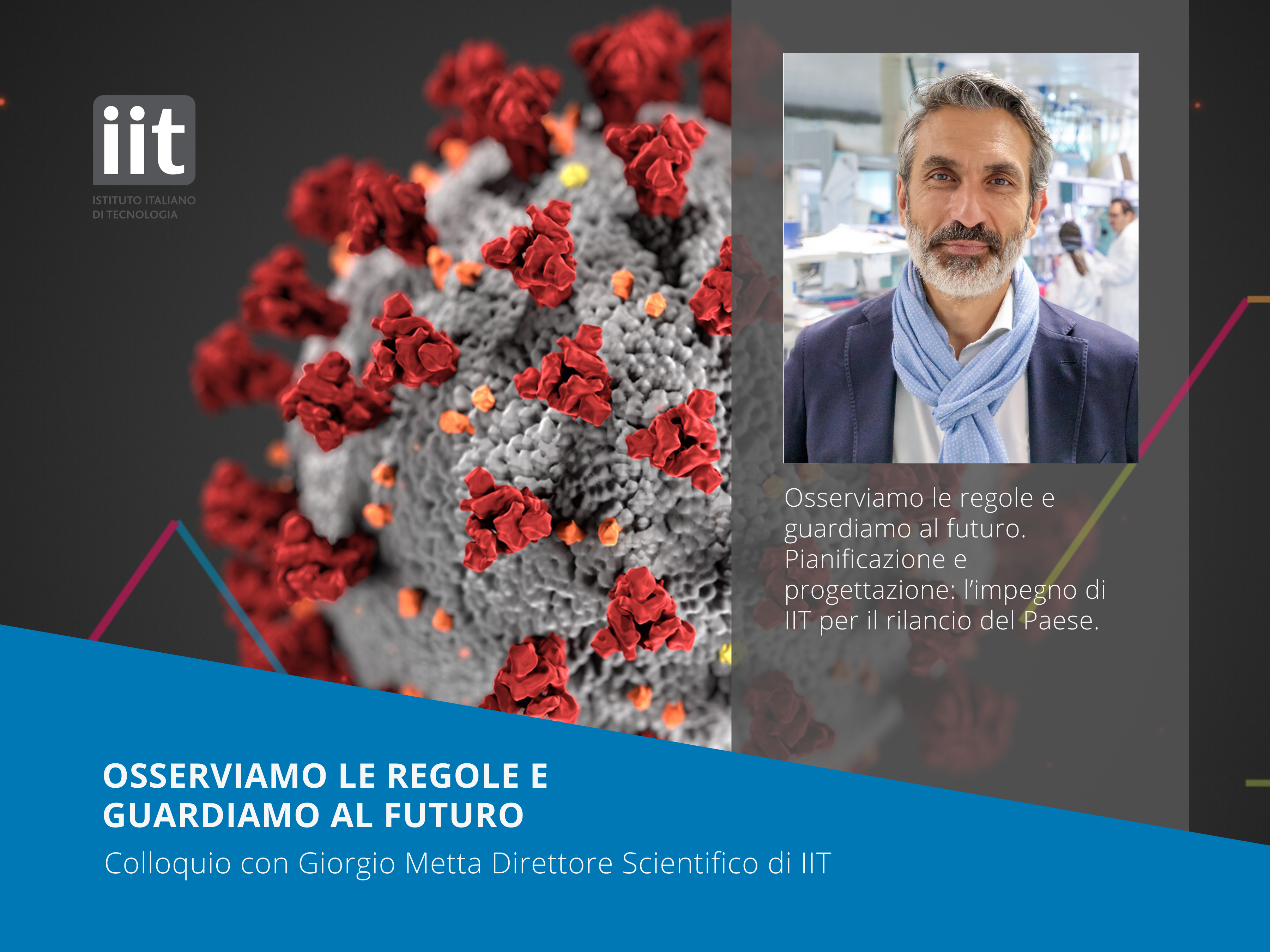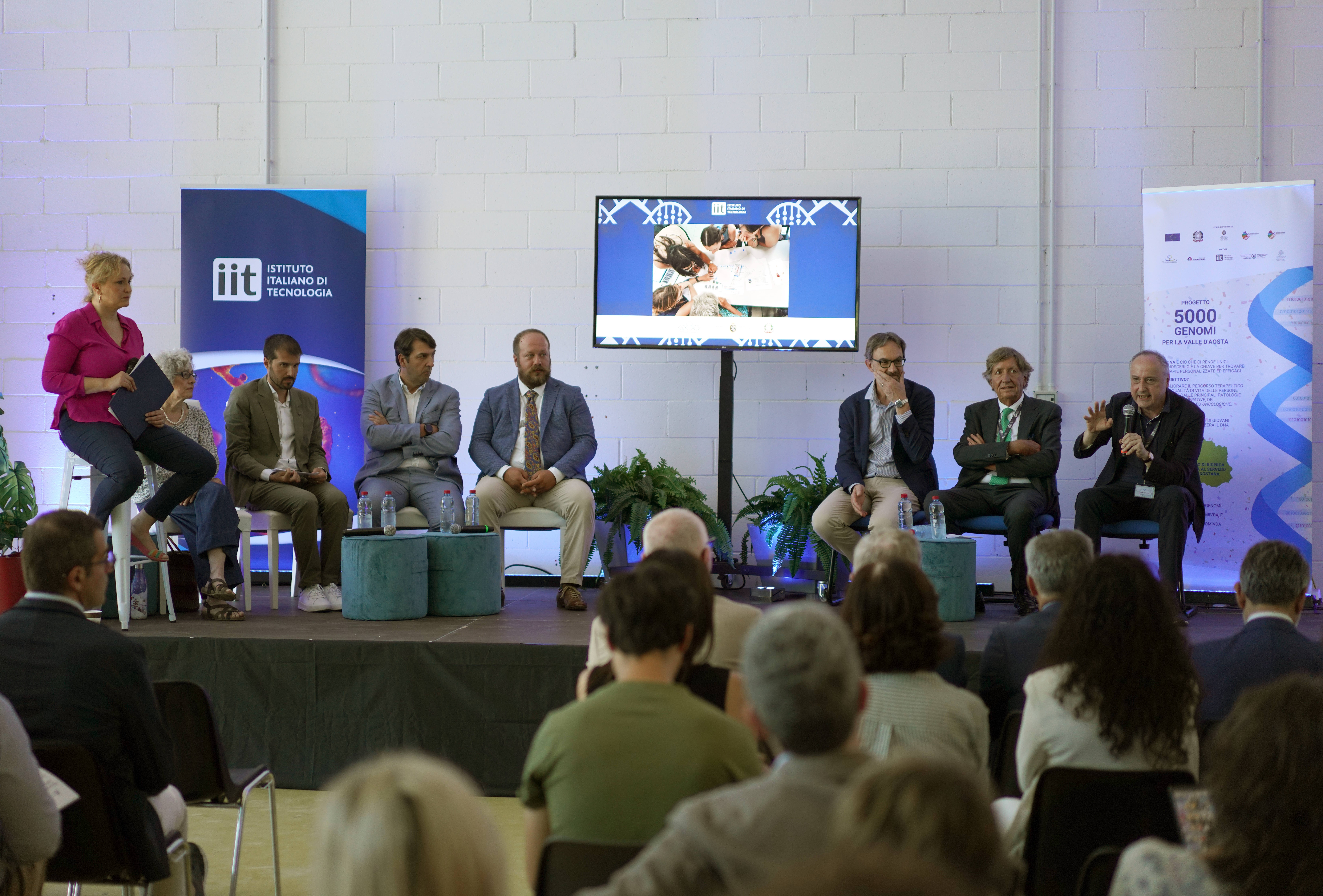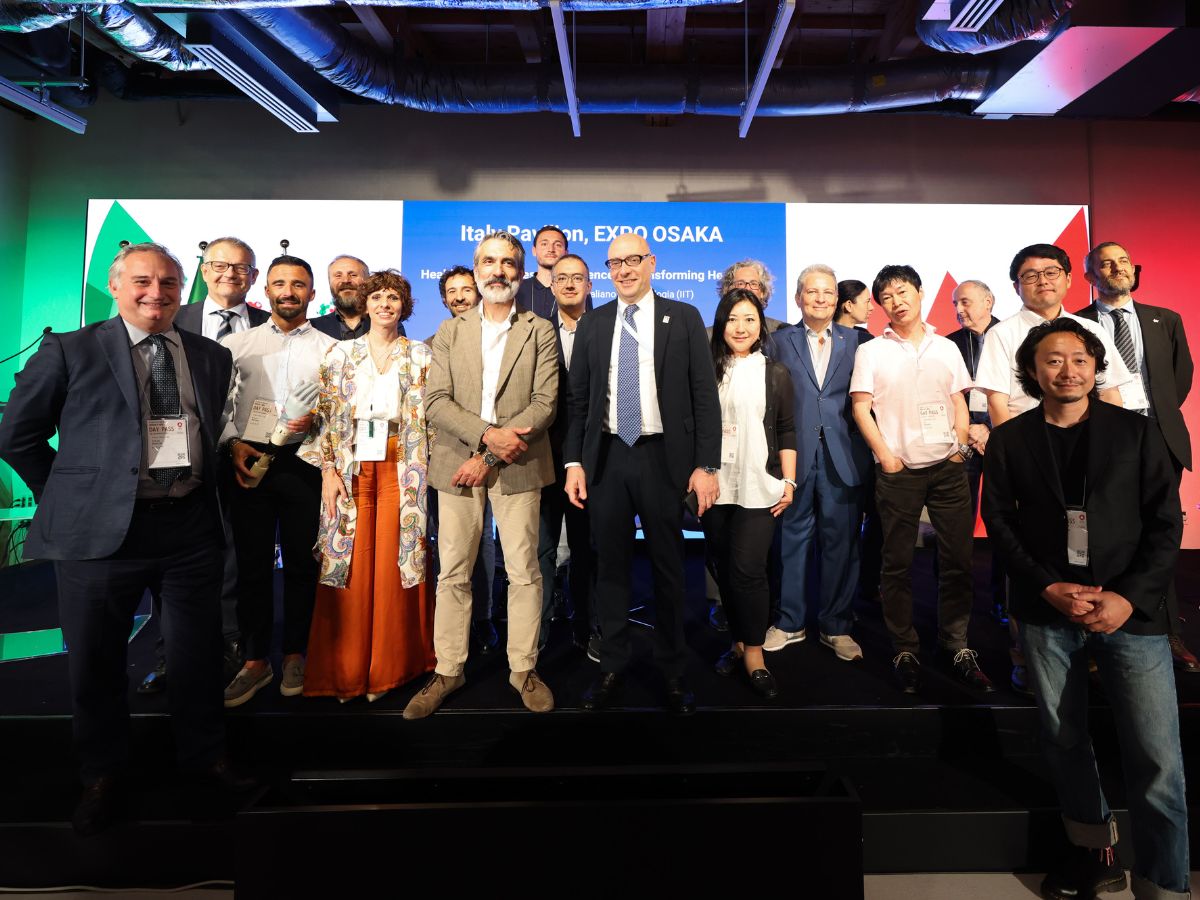(ENG – ITA)
Interview with Giorgio Metta, Scientific Director of the Italian Institute of Technology
The Corona Virus epidemic and the provisions to combat it give an idea of how serious the situation is. For the first time our Society has been overwhelmed by a sense of impotence. How do scientists experience this period and the fact that apparently there are no definitive solutions?
An exceptional event requires an equally exceptional response. As a country, we have chosen to protect human life even at the expense of the economy. It is a strong, ethical choice, which represents what we as a country – but also as a European community – believe should be the priority in the face of the emergency. A scientific vision must avoid an emotional approach and evaluate the situation on the basis of evidence and therefore try to form a prospective vision, based on the results of scientific findings. When, as scientists, we can help solve the problem or alleviate its impact, then we offer our help unconditionally. This also means looking to the future, planning and designing what comes next, and thinking about how our activities can help the country get back on track.
In recent times, in a sort of anti-scientific deranged frenzy, people were raving against vaccines: what can you say about this now that everyone is doing all it takes to find a vaccine against SARS CoV2?
I believe that the serious situation that we are experiencing today in Italy due to the pandemic highlights some problems that tomorrow, when the emergency has passed, it is important we to tackle together. One of these certainly concerns the willingness to respect the authority of science and follow the advice of experts. This applies not only to the emergency situations we are experiencing but also to the indications that are given throughout the year to protect the health of citizens, from the youngest to the oldest. Vaccines are part of the measures that the Ministry of Health provides for and ensures for its citizens. Questioning their usefulness, or even supporting false theories, creates incorrect information and background noise that we do not need and that is dangerous for the country.
IIT has also issued invitations for employees to make maximum use of teleworking. Moreover, our organisation is already very well prepared for these forms of collaboration. But how much can this virtuous model be transferred to other public and private organisations with which we have to collaborate?
One of the objectives of the Italian Institute of Technology is the implementation of an organization that guarantees a higher level of work-life balance and staff welfare. Measures such as teleworking and video communication systems for meetings were implemented some time ago. In these weeks of health emergency, we have defined a measure of “extraordinary teleworking” that can give everyone the possibility to work remotely and reorganize their days.
With its Computational and chemical biology research area IIT can help to identify in the shortest possible time therapeutic solutions for important diseases beyond the one now causing the pandemic.
Computational science is a fundamental research domain in IIT. We have designed very sophisticated simulation software that allows to study the interaction between chemical compounds and complex biological systems. This is a real “in silico” experimentation, that allows to create new chemical compounds that can become effective drugs. In the case of COVID19, the IIT computational group has already been activated, in collaboration with national clinical institutes, to formulate a list of drugs already on the market and evaluate their interaction with the coronavirus. We are trying to understand if these drugs can be “repositioned”, i.e. if their active ingredient – useful to treat other pathologies – could also affect COVID19 in some way. This is an ongoing activity that we hope will yield results in a short time.
In the very near future robotics could be a fundamental aid for a crisis such as the one we are experiencing. What are the areas in which robots will be able to support doctors and nurses in the most risky activities?
Robotics can support the care of people in a variety of areas including surgery, rehabilitation and hospital treatment. With regard to the current health emergency, robots designed to assist in hospital environments would certainly be of great help. There are some products already on the market that allow medical personnel to be remotely present in the wards, giving them voice and, in part, body even if they are far from the hospital. Obviously, these solutions are still relatively experimental and at present they are more a sophisticated technique of video surveillance of patients than a real robotic support to the hospital activity. Unfortunately, there are no ready-made solutions in the world in this sense, there are several experimental robots but nothing on the market. Robotics, artificial intelligence, 5G connectivity will be the technologies on which to focus in the near future to address the problem of care and surveillance in hospital – regardless of specific emergencies such as the one we are facing.
How do you think we will emerge from this crisis from both a scientific and a social point of view? Do you think that, after this shock, men may think of themselves with a reduced sense of omnipotence, that has characterized many surprising behaviours?
It is difficult, to say the least, to define today what the effects of this dramatic event will be. We are still in the eye of the storm and now the watchword is to reduce contagion and ensure that everyone complies with the measures put in place. Like all strong social shocks produced by unforeseeable events, also this event offers mankind the opportunity to observe more in depth the great challenges that all of humanity faces, to start with the one posed by climate change and the environment.
In addition to general remarks, I would like to stress that this emergency places research at the heart of the system, because today it is called upon to identify a vaccine but is also urged to intervene quickly in many different areas, in a future that could, however, be particularly complex.
The Italian Institute of Technology is at the forefront with its innovative capacity and the driving force that has always characterized it in supporting our country. In the short term everyone’s commitment will consist in relaunching “hope for the country” by thinking in a new way also as citizens of research, politics and industry. We have to put the best qualities at the service of our country: our skills, backed by passion and creativity. Perhaps the future will be different – thanks to this “lesson” imparted to us by nature. We must rethink the future with greater balance. A balance guided by the scientific approach supported by the engine of technology. This is a unique opportunity, let’s not waste it. We will strive to find a new paradigm that replaces economic growth with sustainable well-being.
______________________________________________________________________________
(ITA VERS.)
Colloquio con Giorgio Metta, Direttore Scientifico dell’Istituto Italiano di Tecnologia
L’esplosione dell’epidemia prodotta dal Corona Virus e le disposizioni emanate per contrastarla rendono l’idea della gravità della situazione. Per la prima volta la nostra Società è travolta da un senso d’impotenza. Come vive lo scienziato questo momento apparentemente privo di soluzioni definitive?
Ad un evento eccezionale si risponde in maniera altrettanto eccezionale. Come Paese abbiamo scelto di proteggere la vita umana anche a discapito dell’economia. È una scelta forte, etica, che rappresenta quello che come Paese – ma anche come comunità europea – riteniamo debba essere la priorità di fronte all’emergenza. La visione dello scienziato deve evitare l’approccio emotivo e valutare la situazione su evidenze e quindi cercare di avere una visione prospettica, sulla base delle risultanze dei rilievi scientifici. Quando possiamo contribuire a risolvere il problema o ad alleviarne l’impatto, allora offriamo il nostro aiuto a 360 gradi. Questo significa anche guardare al futuro, in un’ottica di pianificazione e progettazione di quello che ci sarà dopo e quindi pensare come le nostre attività potranno aiutare il Paese a ripartire
In periodi recenti, in una sorta di ubriacatura antiscientifica, si vaneggiava contro l’utilità dei vaccini, cosa si può rispondere oggi quando si sarebbe disposti a tutto per avere un vaccino contro il SARS CoV2?
Credo che la grave situazione che stiamo vivendo in Italia dovuta alla pandemia evidenzi alcune problematiche che un domani, quando l’emergenza sarà passata, sarebbe importante affrontare tutti insieme. Una di queste riguarda certamente la capacità di rispettare l’autorevolezza della scienza e di seguire i consigli degli esperti. Questo vale non solo per le situazioni di emergenza che stiamo vivendo ma anche per le indicazioni che vengono date durante tutto l’anno per salvaguardare la salute dei cittadini, dai più piccoli ai più anziani. I vaccini rientrano nelle misure che il Ministero della Salute indica e assicura ai propri cittadini. Mettere in dubbio la loro utilità, o addirittura sostenere teorie false, crea cattiva informazione e rumore di fondo pericolosi per il Paese, dei quali non abbiamo bisogno.
Anche IIT ha emanato inviti affinché i collaboratori utilizzino al massimo il telelavoro. Peraltro, la nostra organizzazione è già molto preparata a queste forme di collaborazione. Quanto, però, questo modello virtuoso è trasferibile ad altre organizzazioni pubbliche e private con le quali dobbiamo collaborare?
L’Istituto Italiano di Tecnologia ha posto tra i propri obiettivi l’attuazione di un’organizzazione che garantisca un più alto livello di work-life balance e di welfare del personale. Abbiamo da tempo messo in atto misure come il telelavoro e sistemi di videocomunicazione per le riunioni. In queste settimane di emergenza sanitaria abbiamo definito una misura di “telelavoro straordinario” che possa concedere a tutti la possibilità di lavorare in remoto e riorganizzare le proprie giornate.
IIT con l’area di ricerca Computational and chemical biology può contribuire ad individuare nel minor tempo possibile soluzioni terapeutiche per malattie importanti oltre quella ora all’attenzione.
Le scienze computazionali sono un dominio di ricerca fondamentale per IIT. I nostri hanno progettato software di simulazione molto sofisticati che permettono di studiare l’interazione tra composti chimici e sistemi biologici complessi. Questa è una vera e propria sperimentazione “in silico”, con cui si riescono a ideare nuovi composti chimici che possono diventare farmaci efficaci. Nel caso di COVID19, il gruppo di computazionali dell’IIT si è già attivato, in collaborazione con istituti clinici nazionali, per formulare una lista di farmaci già esistenti in commercio e valutarne la loro interazione con il coronavirus. Si cerca di capire se questi farmaci possano essere “riposizionati”, ovvero se il loro principio attivo – utile a curare altre patologie – possa colpire in qualche modo anche il COVID19. È un’attività in corso che speriamo possa dare frutti in breve tempo.
La robotica potrebbe essere, in un futuro molto vicino, un ausilio fondamentale per una crisi quale quella che stiamo vivendo. Quali sono gli ambiti nei quali i robot potranno affiancare medici ed infermieri nelle attività più rischiose?
La robotica può supportare l’uomo nella cura delle persone in diversi ambiti tra i quali la chirurgia, la riabilitazione e l’assistenza ospedaliera. Relativamente all’attuale emergenza sanitaria, i robot pensati per assistere negli ambienti ospedalieri sarebbero sicuramente di grande aiuto. Esistono alcuni prodotti già commerciali che permettono la presenza in remoto di personale medico nelle corsie, dandogli voce e, in parte, corpo anche se distanti dall’ospedale. Ovviamente queste soluzioni sono ancora relativamente “di frontiera” e rappresentano più una sofisticata tecnica di videosorveglianza dei degenti che dei veri e propri supporti robotici all’attività ospedaliera. Sfortunatamente non esistono al mondo delle soluzioni già pronte in questo senso, esistono diversi robot a carattere sperimentale ma nulla sul mercato. Robotica, intelligenza artificiale, connettività 5G saranno le tecnologie sulle quali puntare nel prossimo futuro per affrontare il problema dell’assistenza e sorveglianza in ospedale – a prescindere dalle specifiche emergenze come quella che stiamo affrontando.
Come pensi usciremo da questa crisi sia dal punto di vista scientifico sia da quello sociale. Credi che, dopo questo shock, l’uomo possa pensare a sé stesso riducendo il senso di onnipotenza che connota molti sorprendenti comportamenti?
Definire oggi quali saranno gli effetti prodotti da questa drammatica evenienza è quantomeno difficile. Siamo ancora nell’occhio del ciclone e ora la parola d’ordine è ridurre i contagi e fare in modo che tutti osservino le prescrizioni. Come tutte le forti scosse sociali prodotte da eventi imperscrutabili, si offre all’uomo la possibilità di osservare con maggiore profondità le grandi sfide dell’umanità intera, una su tutte quella legata al cambiamento climatico e all’ambiente.
Oltre alle osservazioni di carattere generale vorrei sottolineare che questa emergenza pone al centro del sistema la ricerca, chiamata oggi ad individuare un vaccino ma sollecitata ad intervenire rapidamente in tante aree diverse, in un futuro che potrebbe comunque essere particolarmente complesso.
L’Istituto Italiano di Tecnologia è in prima linea con la propria capacità innovativa e con la forza propulsiva che l’ha sempre connotato nel sostegno al nostro Paese. L’impegno di tutti consisterà nel breve termine di rilanciare “la speranza del Paese” ragionando in modo inedito anche come cittadini di ricerca, politica, industria. Dobbiamo mettere al servizio del nostro Paese le qualità migliori: le nostre competenze corroborate da passione e creatività. Forse il futuro sarà diverso – grazie a questa “lezione” della natura. Dobbiamo ripensare al futuro con maggiore equilibrio. Un equilibrio guidato dall’approccio scientifico sostenuto dal motore della tecnologia. È un’occasione unica non sprechiamola. Ci impegneremo a cercare un nuovo paradigma che sostituisca la crescita economica con il benessere sostenibile.





